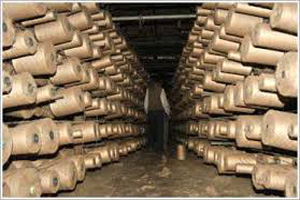
Jute industry facing severe challenges over thinning demand
YarnsandFibers News Bureau 2014-06-23 14:00:00 – KolkataJute is one of the oldest industries in India depending a lot on government orders. This year the industry is facing one of its most severe challenges due to thinning demand. Indian Jute Mills Association (IJMA) and other mill owners have straight on blamed rapid decline in procurement of jute bags for food grains this year for piling jute stocks and drastic reduction in production.
The Union textile ministry though is trying to channelize more orders to the ailing jute industry, but it feels that low procurement from central and state agencies is not the cause of current predicament of the industry. Incidentally, Food Corporation and state procurement agencies of Punjab, Haryana, Uttar Pradesh, Chhattisgarh and Madhya Pradesh are the major buyers of jute bags.
The textile ministry (jute is under this ministry) is in talks with different state governments for more orders for the industry. It has also procured 1.07 lakh bales of jute order for the industry this month.
According to Jute commissioner Subrata Gupta, statistically the theory of rapid decline in procurement from central and state agencies does not hold good. As of April this year, the procurement from jute industry was only 11% less compared to the year-ago period. But compared to 2011-12, the procurement is 4% more. So in no way, one can say that procurement has come down drastically.
However, Gupta admitted that there was an over-estimation of food grain production in 2012-13 that resulted in dilution of mandatory packaging order. But he argued that food grain procurement is cyclical and depends on many factors. So the absolute amount could vary. There is some carry-forward stocks of both jute and poly bags from the last year. But it can happen in a cycle.
The main reason behind the current state of affairs of the jute mills is less order from food grain and sugar sectors. Followed by the North Brook incident which lead to the suspension of work in five more mills. The reasons shown are piling stocks and deteriorating law and order on the premises. There were 53 operational mills in the state and out of that six have declared suspension of work in the last 10 days, said IJMA chairman Raghavendta Gupta.
But the one of the reasons seen is the huge price difference between jute and poly bag due to which the jute industry is failing to make progress in private sector food grain packaging. The price of polybag is only Rs.18 to jute bag price of Rs.38. The difference is so much that private sector food firms prefer use polybag to jute bags. The industry is facing stiff competition from cheaper synthetic fibres and plastic.
The jute export market has been also hit by the unrest in the Middle East and Thailand. Moreover, jute products from Bangladesh have flooded the domestic market.
Over three lakh people are employed in 53 operating jute mills and more than 12 lakh people are dependent on jute industry with another two lakh farmers have jute as the only cash crop.
Market Intelligence
Ask for free sample Report

experience
Customer Base
dedicated team
Countries Served Worldwide









